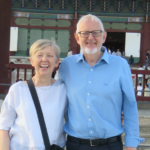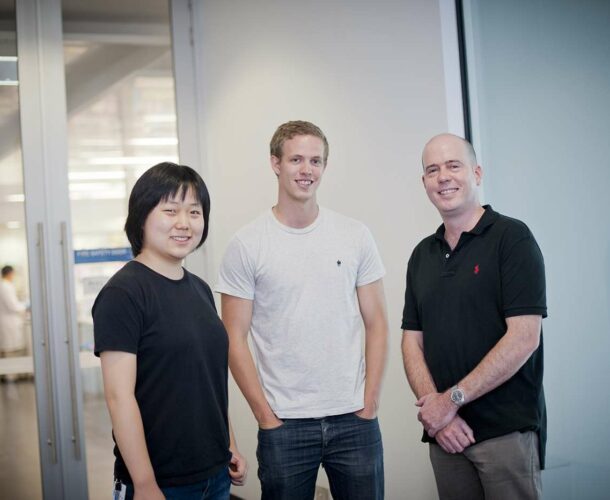An impossible world to imagine
“What does your Dad do?” This standard bit of getting-to-know-you schoolyard banter wasn’t such an easy question for young Michael Harris to answer.
As a boy he understood his father, Dr Alan Harris, was a scientist; that his research had something to do with cancer; that he worked very hard – six long days a week, vanishing into his home study many evenings and Sundays. Beyond that, “it was all a mystery to me,” recalls Michael Harris today.
“Even when I look back at things people have written about what Dad did, the language is so technical, and the idea of antibodies and cell death, it’s still very foreign to me.” As a child it was an impossible world to imagine, let alone enter.
But there were exhilarating glimpses of his father’s reality. Occasionally there would be visits to the Walter and Eliza Hall Institute, where Dr Harris worked for 36 years. Young Michael and his sisters would poke around the mysterious equipment on the benches and stick their fingers in the little machines where the test tubes would shake and buzz.
By nature, a modest character
Forty years later the mere mention of the mouse room stirs up memory of the overwhelming odour, of boxes and boxes of mice lined up in racks. “I really strongly remember, too, when I first came across a computer. It had these massive floppy discs that must have been a foot square. It just seemed so technological, so cutting edge.”
But as for his father’s endeavours, “I always thought he was one of many researchers who beavered away at the institute. I had no sense that he had achieved anything particularly great”. He was, by nature, a modest character.
It was really only after Dr Harris’s death – from lung cancer, age 68, in 2006 – that Michael Harris began to grasp the dimensions of his father’s scientific contribution. He was eulogised for his watershed breakthrough in generating continuously growing lines in antibody-producing cancer cells. These became a critical and enduring tool in laboratories worldwide, used across a wide spectrum of medical research, and paved the way for others to win a Nobel Prize.
Memorial to recognise his substantial contribution
But the memorial that most touched Michael Harris was the announcement by the institute that it would establish the Alan W Harris Honours Scholarship, which would provide a $5000 annual allowance for Honours students. “It brought it home to me that he had made a substantial contribution, and I am proud of that.”
Mr Harris, a social worker and counsellor, and his wife Kelli, a counselling psychologist, decided that they would become donors to the institute. They wanted to maintain a connection with the institute, and to honor Dr Harris’ legacy by supporting the scholarship established in his name. Recalling the financial struggle of their own student days, the idea of providing some material support for up-and-coming scientists also appealed to them.
“For Kelli and I, when we support something financially, it is very important that we believe in what it is doing. I don’t mean ‘believe’ in a faith sense, I mean in a real evidence-based sense. And you can’t get more evidence-based than what they are doing at the institute.”
Supporting efforts that make a difference
The couple hope their money can help encourage young scientists working across a range of disease – from cancer to malaria – and across the spectrum of need. “We like to support efforts to make a difference to lives in developing countries as well as our own, that might have an impact in areas where disease is more prevalent because of poverty or poor sanitation.”
This approach echoes what Michael Harris remembers as an unambiguous aspect of his father’s character, one that was – unlike his mysterious scientific life – always plain to his family in his words and actions. “He was not a grand-stander. He was a progressive, an egalitarian.”



